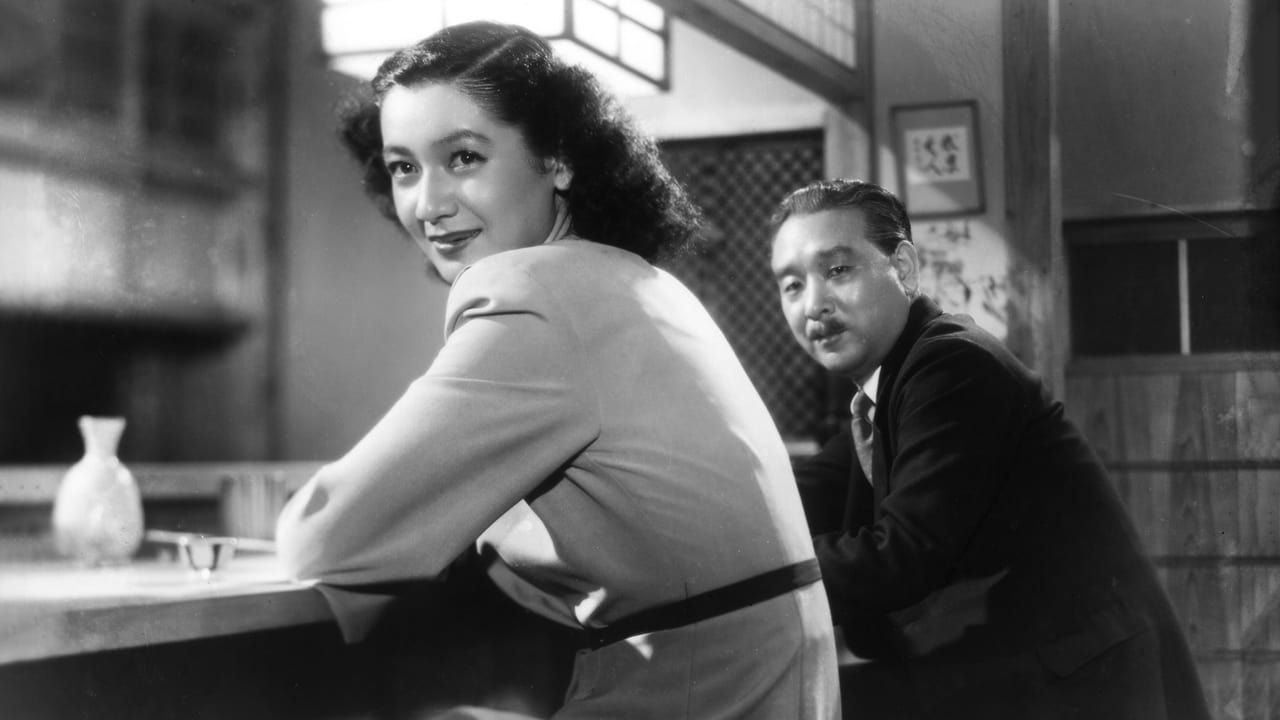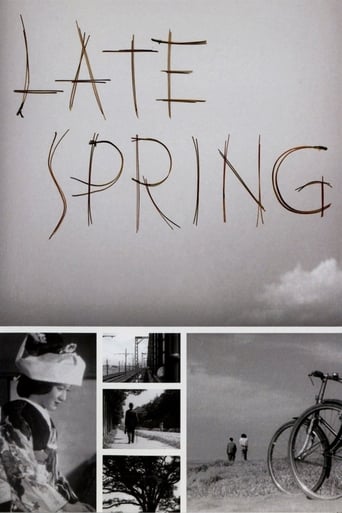

Who payed the critics
... View MoreIntense, gripping, stylish and poignant
... View MoreAbsolutely brilliant
... View MoreThis movie was so-so. It had it's moments, but wasn't the greatest.
... View MoreNoriko is a shy 27 year old woman who has recently overcome an untold medical condition. Now better, it is the strong desire of her father and aunt that she be married before its too late, but Nori appears to have lead a sheltered life, and is completely attached to her single father - she is happy with the life she is living and has no desire to change. Only when her father becomes interested in remarrying himself, does Nori accept her fate as a future wife.In many ways this is a coming of age story from girl to woman, the challenging but inevitable separation from child and parent, albeit happening some five to ten years later in life than modern audiences might expect. As a modern Western viewer I can only take the films word for it that a daughter may really have been so attached to her father in this manner (she appears to have neither any sexual nor motherly desires of her own - hard to believe at 27 - or if she does, they remain completely unselfishly suppressed), and therefore required a suspension of disbelief that may or may not have been required by viewers from other cultures, in other times. In typical understated Ozu style it is located in suburban Japan, and is very conversational. The power of this style is captured subtly - in the way momentous life shifts can spring from mundane circumstances. It has a very pleasant, elegant air for the duration, and is beautifully shot, but I would argue that until the final act, "Late Spring" is too conversational, too mundane, and often largely unmoving. When the surprising twist occurs, in which the self-sacrifice of the father for the sake of his daughter can be fully appreciated, it is a gut wrenching testament to the true power of family love. The sublime ending of "Late Spring" makes it worthwhile viewing, though it certainly would have benefited from getting there quicker - not in pacing, which was assured in an unhurried manner - but in content, which became a touch repetitious (quite a few scenes in the first two- thirds are insignificant). The scene mid way through in which Nori and her father attend the Noh (classical Japanese musical drama) is also sublime - an expertly crafted display of devastating emotions that can't be expressed in a public space. Six minutes where not a word is uttered, and not a word is needed.
... View MoreLATE SPRING is a film that is perhaps overly praised for something that the audience acts as real. Name the movie is lucid and alludes to something that should not be delayed anymore. End of something and the beginning of a new. The film was made with a lot of taste. Focused on internal emotion and characterization.Description of the story that has not at some point be described as subjective. Only life middle-class family, irrespective of external changes retains inner warmth and feelings. Here we can talk about the connection and closeness people with outside influences.The essence is in the relationship between father and daughter. Middle-aged professor is afraid that his daughter to remain a spinster. The daughter wants to continue to live with his father. Everything after that is a compromise, not conflict of opinions. At a certain point in life one must accept and understand the change. In this case, happiness is relative. The tendency of the director is to reach out to the audience with the warmth of family relationships between the characters in the film.
... View MoreNoriko is twenty seven and perfectly content in dutifully serving his father in the domestic household. This is an affront to Aunt Masa, who is of the opinion that a woman of her age is much too old to be staying at home cooking and cleaning and resolves to set her up for dating and eventually (well, a little quicker than that), marriage. For Aunt Masa this is not just a personal crisis but a cultural one; she represent the traditional past in which Noriko's rightful place is in the domestic sphere, but alongside her own husband instead of her ageing father. Late Spring engages with this cultural clash borne out of the modernity of post-war Japan. The previous year a law had passed to allow those over twenty to seek marriage without the consent of their parents. Remarrying and divorce are key actions expressed within the film. And yet for Shukichi it is not a matter of parental permission given to Noriko; it is vital that he trick her into marriage rather than allow her to do so via his patriarchal authority. For Shukichi, marriage is not so much a means to further his own lineage as tradition states, but an opportunity to birth new love and life. Ironically his daughter has the opposing view; she begs forgiveness for even entertaining the idea of enjoying another man's company and leaving his home, and is offended by the thought of him remarrying. Yoshiyasu Hamamura, without a single word spoken, makes this clear in his editing.Late Spring navigates the Japanese home with the utmost attention to geometry and the intimacy within those spaces. Amongst the tea parties, the Noh performances, the grooves of the pagodas, and the meditative zen gardens, the characters are locked in the most rigid of compositions in the domestic sphere. Ozu is infamous for his lack of camera movement - one prominent effect of this being that the compositions are never marred and retain their full force throughout the shot (A similar way in how Kubrick zoomed rather than tracked in Barry Lyndon). Even if a scene calls for the camera to move Ozu is steadfast in his compositional rigidity; in the bicycle ride scene the camera follows Setsuko Hara smoothly, maintaining the confines of the frame and suspending her beaming face aloft in the air with a bizarre, daydream-like quality. Most of the time it is placed right next to the characters as if it was another person kneeling on the tatami mats itself. The flat, perfectly symmetrical POV head shots thrusts us into the intimacies of their conversations immediately. Ozu is less concerned with logical sequencing than he is with letting the image and actors speak for themselves. At times he will simply linger and let the natural ticking of the clock prolong our patience and make the mundane (a closed door, an empty room) agonising. Late into the film, there is an insert of simply a vase, but when we cut back to Noriko, tears are streaming down her face. This seems to me (and it has been highly contested) to be the perfect crystallisation of the still, unmoving life in which she yearns to linger in just a while longer. But she is twenty seven. Setsuko Hara steals much of the spotlight. How could she not, with her beaming, radiant smile, sharply accentuated nose and wide eyes that flutter when she laughs and leak when she begs forgiveness from her father. She is so content to be the housewife (or housedaughter) that when circumstances force a change in her lifestyle you can visually see the color drain from her face and her features crease up. Ozu at times uses the camera as a feeble attempt to shield these fragile emotions. A heartbreaking scene sees Noriko suddenly decide she has 'other plans' and scurry away across the other side of the road, away from her father, where they both then continue to walk along (this mimicry of form was used more than once by Ozu). We do not see her face but we can guess what is streaming down it; it also causes us to re-evaluate every breaming smile she has flashed. Another effect is a momentary pause in Shukichi's stride, for just a slight moment - perhaps he has finally been convinced that his daughter can no longer be shackled to his home. There are many of these moments in Late Spring. The ending is often talked of, but I think the climax of the film's emotions comes earlier. Shukichi has, up to that point, uttered dialogue mostly consisting of quiet affirmations and modest little "Ums" and "Ahs" with his bowed head. But he sees his daughter's hesitation at leaving the household and being married off, and slowly and softly begins a monologue that recalls his own marriage. The late wife and mother was not always happy initially, but the two worked hard together and found happiness and a life to share. It is not only his blessing for Noriko but also an open acknowledgement of the changing times and values; the two marriages have begun in different conditions, and she has a chance that he never had. For me the power of the film lies here; not only does it heart-wrenchingly encapsulate the painful truth of growing up from the father's perspective, but it also casts shade on the rather impromptu decision to wed the widow Miwa. We can gleam such an age-old and tested relationship that appears between the cracks even after one of them has passed on, and the father too wants his daughter to experience this. I think we can guess from this scene that he never had any intention of marrying Miwa, but simply wants the best for Noriko. The speech makes his character whole, and utterly unselfish.
... View MoreLate Spring is a quiet, contemplative masterpiece. This is not a movie for the impatient or action-oriented, but instead an examination of the way families communicate--or fail to; as in most Ozu films, much is never said, but is often shown for the viewer to observe and evaluate--thus, on an easy bicycle trip to the largely uninhabited beach, two young people in Postwar Japan pass a triangular Coca-Cola sign they don't bother to see--but the viewer sees it clearly...And clearly, the values of the country are changing in so many ways and a tradition-bound father must adapt to his daughter's needs.An involved, willing viewer of Ozu can always carries away more from the film than may be evident at the time, a realization that perhaps the wisest thing to do with the gift of life is to adapt to the way things are. Most of the most beautiful things in life are tinged in some with with melancholy or sadness.
... View More